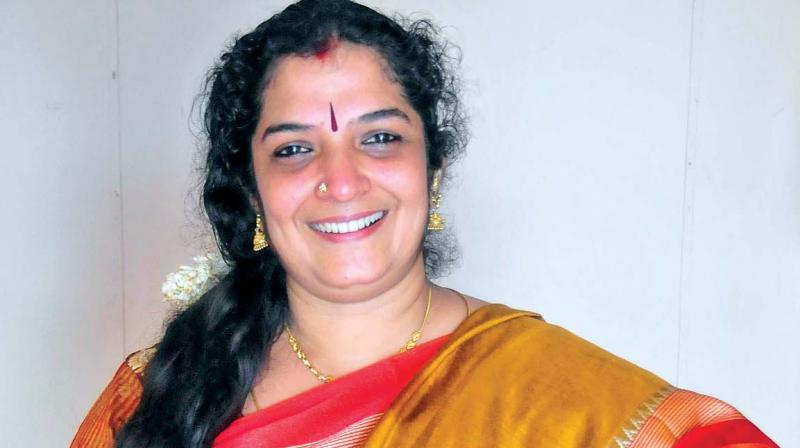Baby wants more jobs for artistes
Carnatic musician Dr Baby Sreeram talks about her early days in Thiruvanantha puram, moving to Chennai, her life with Palakkad Sreeram.

At 10 am, Dr Baby Sreeram stood outside her agraharam on Valyashala Gramam, a street near Thycaud, Thiruvananthapuram. She was waiting for a visitor, standing outside at the time they fixed to meet. Discipline had always been a habit for this musician, but she turned sweetly to greet the visitor, who came several minutes late. With all her knowledge in Carnatic music - she has a Ph.D in 'An analytical study on Bhashanga Ragas' - Baby can turn extremely humble and sweet, talking about moving to Chennai more than 25 years ago, about her childhood years in Thiruvananthapuram, and about her genuine concerns for struggling musicians.
"Everyone sings in my family. I must be the fifth or sixth generation musician. My grandfather and his grandfather were 'asthana vidwan's (court musicians). Our roots go back to Tirunelveli but on the Maharaja's invitation, the family moved to a village called Payanam behind the Padmanabhapuram Palace in Thuckalay. I am not sure when we moved to Thiruvananthapuram. But I grew up in an agraharam in Karamana, and could hear music from all the houses around us - someone would play the violin, someone else the mridangam. Children who sang well were called to houses to sing," Baby fondly remembers a time gone by. She has now come to the capital to sing for the Swathi Sangeethotsavam in Kuthiramalika, which will be held today on Wednesday.
She owes a lot to all the musicians in Thiruvananthapuram, she says, because as a child she had been to a lot of kutcheris. "If my music amounts to anything today, it is their gift," she says. It is after her degree in music that she goes to Chennai, to broaden her knowledge. As much as she loved her hometown, she wanted to learn the art a lot deeper and Chennai held that promise. For three years, she trained under Sangita Kalanidhi T.M. Thiagarajan, while doing her Masters in correspondence. She was a rank holder for her degree and PG and received a direct A-grade from All India Radio, a dream coming true.
Casually slipping into a tune, and walking inside the agraharam, Baby talks about her days teaching at the Chembai Sangeetha College, and then taking her PhD. There was a wedding too, before all that, to her friend and musician Palakkad Sreeram.
They have their respective spaces and accommodate their different methods in music. She would teach him some compositions and he would help her with musical mathematics. Together they sit and practise, with no ego, but they don't prefer performing together. "We have different styles. I am a traditional, conventional musician, I don't go beyond borders. He likes to experiment on stage. We like to enjoy our space." Neither does she work much in movies like Sreeram. "I have sung for him when he composed for Mazhamegha Pravukal, and once for M. Jayachandran - the song Karumbananu Kannan for @Andheri - because he is a dear friend." She has now sung a Tamil song called Om Shanthi for RV Rajesh's album Roots n Routes, on the theme of world peace.
But Baby is happy in her world of Carnatic music, that she began loving as a young girl, and even composing as a child of eight. She also sings in the rare shruti of 2.5 kattai or D#. "I don't have a lot of knowledge in any language but when I compose, somehow the words flow," she says. She has composed some varnams in rare ragas, swarajatis similar to Syma Sastri's swarajatis, thillanas - Madhavan Marumakane in charukunthalam, Smaramyaham in amarasenapriya and Arulpuriya vendum in komalangi, to name a few.
"But I discouraged myself from composing more. We have so many great kritis from so many great musicians. Maharaja Swathi Thirunal has himself composed so many. Coming from Thiruvananthapuram, I am very familiar with his work and make sure I sing at least one of his compositions in every one of my kutcheris," she says.
And then switches to a serious topic she has concern for. While it is great that the government promotes art forms so much through youth festivals, Baby wishes there is also a scheme that would give those who live with their art, a job.
"The fellowships they grant should go to those artistes who live with their art. Similarly, I find retired hands coming to work in faculty of music colleges. But it should be qualified as well as performing artistes who teach. If you don't perform, you can only teach theory," she says.
Baby had students too but she stopped taking any, when she found none too dedicated. "You cannot learn an art in your free time. Music education is a journey that can never stop," she says. Baby has such strong reservations about this that she stopped her children - Bharath and Anagha - from going to regular school and put them in an open school. "So they don't have the pressure to do Maths and Science homework every day and instead will have a lot of time to focus on where their talents lie. Bharath has been a child prodigy in music, and Anagha likes to write."
